

 |
 |
 This Gear section is comprised of what was left after we took care of the knives and the flashlights. Some pretty cool and useful stuff for the most part.
This Gear section is comprised of what was left after we took care of the knives and the flashlights. Some pretty cool and useful stuff for the most part.
What follows are just the highlights.� We have provided the specifications we received from the manufacturers for the most part; some are much better than others in what they provide, so blame them if you are missing some spec you'd have liked to have seen.
Prices quoted are manufacturer's suggested retail price as of March 1, 2003 (we don't waste pixels, or your intelligence, on 95 cents, we just round up). Most gear covered here can be purchased at significantly discounted prices from those quoted.
This SHOT Show Report is split into three sections: Knives (including multi-purpose tools), Lights (including flashlights and headlamps) and Gear (everything else).� Click on the link in this paragraph or at the bottom of the page to get to the next section, or to any of the other sections.
Assembling this SHOT Show Report is a major undertaking for this one-man show. Please consider making a tax-deductible donation to the Equipped To Survive Foundation if you find this report to be of value to you. The Equipped To Survive Foundation is a tax-exempt non-profit corporation that supports the continued operation and expansion of Equipped To Survive™ and which allows me to attend shows shuch as this and report to you on the latest and greatest gear. In many cases Equipped To Survive™ has been first by months to publicise new and exciting survival and preparedness gear. Again, donations are fully tax-deductible. Click here to make a tax-deductible donation or to find out more. Thanks very much for your support and consideration.
 ACR really didn't have any exciting new product to show, per se, but with the upcoming legalization of 406 MHz PLBs (Personal Locator Beacons) in the U.S. come July 1, 2003 (see story here), they have started to prime the pump, both for their GyPSI 406 PLB in particular, and the concept in general. While the marine consumer is very familiar with the concept of 406 MHz emergency beacons and have been buying 406 EPIRBs for years, and some pilots are aware of the advantages of 406 MHz ELTs, even if the high cost to date has slowed their introduction into wider aviation use, the outdoors sports consumer seems to have little clue. They don't understand how it works, what's involved, why it's a good idea, or much of anything else related to the concept for that matter. The PLB manufacturers and the Search and Rescue services and community have their job cut out for them to educate the public that will most benefit from these devices -- in lives and resources saved.
ACR really didn't have any exciting new product to show, per se, but with the upcoming legalization of 406 MHz PLBs (Personal Locator Beacons) in the U.S. come July 1, 2003 (see story here), they have started to prime the pump, both for their GyPSI 406 PLB in particular, and the concept in general. While the marine consumer is very familiar with the concept of 406 MHz emergency beacons and have been buying 406 EPIRBs for years, and some pilots are aware of the advantages of 406 MHz ELTs, even if the high cost to date has slowed their introduction into wider aviation use, the outdoors sports consumer seems to have little clue. They don't understand how it works, what's involved, why it's a good idea, or much of anything else related to the concept for that matter. The PLB manufacturers and the Search and Rescue services and community have their job cut out for them to educate the public that will most benefit from these devices -- in lives and resources saved.
One of the long-standing promotional tag lines, and the true promise, for those promoting 406 MHz emergency beacons has been that they "take the search out of search and rescue." ACR has decided to have some fun while making that point and attracting its fair chare of attention with a St. Bernard in their booth, complete with whisky cask. Here I am pictured with Stella, an AKC Champion show dog, who was too busy making friends to worry much about being put out of work by the new 406 PLBs.
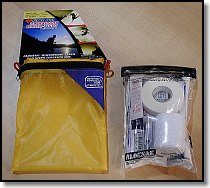 Adventure Medical Kits showed off two entirely new series of first aid kits, as well as some refinements to the line. The "Ultralight Series" is designed for those seriously concerned about weight. The goal was to include the essentials only and packaged as light as possible while still protecting the contents from the ravages of the trail.
Adventure Medical Kits showed off two entirely new series of first aid kits, as well as some refinements to the line. The "Ultralight Series" is designed for those seriously concerned about weight. The goal was to include the essentials only and packaged as light as possible while still protecting the contents from the ravages of the trail.
The first goal is simply a matter of prioritizing the supplies, which they have done using quality components, as you'd expect from AMK, coming up with three kits; the "Ultralight .5" ($13.50) "Ultralight.7" ($17) and "Ultralight .9" ($26), weighing 3.5, 6.5 and 9.5 ounces, respectively. The kits are contained inside a yellow silicone impregnated 1.3 oz. ripstop nylon zippered pouch. The pouch has two loops of nylon cord for securing it as needed. The supplies are stored inside a waterproof Aloksak plastic pouch (two of them in the case of the .9 kit) by Watchful Eye Designs which is rated to 200 feet and will keep the first aid contents dry pretty much guaranteed. The Aloksak(s) are inserted inside the nylon pouch. (AMK is now the exclusive distributor of the Aloksak for the outdoors markets).
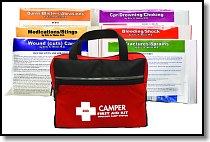 The moderate priced "Camper Series" features AMK's new "Easy Care First Aid System", a modular component system with individual pouches inside the kit containing all the supplies and equipment needed to treat a specific first aid situation. There are six modules: Stop Bleeding/Shock, Wounds (Cuts) Care, Blister/Burn/Abrasion, CPR/Choking/Drowning, Fracture/Sprain/Strain and Medication. Three of the Camper Series kits are equipped with the Easy Care System modules, the Camper 200, Camper 300 and Camper 400, priced at $23, $31.50 and $43. The modular concept works especially well for those who are not as familiar with first aid as they ought to be, simplifying matters a great deal. Modular kits are one of those love or hate things, but for many this is a better solution than a traditional style kit.
The moderate priced "Camper Series" features AMK's new "Easy Care First Aid System", a modular component system with individual pouches inside the kit containing all the supplies and equipment needed to treat a specific first aid situation. There are six modules: Stop Bleeding/Shock, Wounds (Cuts) Care, Blister/Burn/Abrasion, CPR/Choking/Drowning, Fracture/Sprain/Strain and Medication. Three of the Camper Series kits are equipped with the Easy Care System modules, the Camper 200, Camper 300 and Camper 400, priced at $23, $31.50 and $43. The modular concept works especially well for those who are not as familiar with first aid as they ought to be, simplifying matters a great deal. Modular kits are one of those love or hate things, but for many this is a better solution than a traditional style kit.
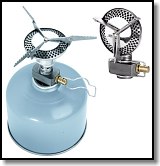 Brunton (a subsidiary of SILVA Sweden) offered up some very innovative new gear that was notable for its compactness and simplicity.
Brunton (a subsidiary of SILVA Sweden) offered up some very innovative new gear that was notable for its compactness and simplicity.
While we generally prefer stoves that will burn just about anything flammable, and Brunton's Optimus Nova is a good example, the "CRUX" foldable butane canister stove ($70) was just too cool to pass up. The trick with stoves is to get something that works, but is compact enough in storage, and light enough, that you don't begrudge it being there. The CRUX folds up into a compact 2.2 x 2.9 x 1.3 inches and weighs just 3.1 ounces. A hinge allows it to fold sideways to the valve and the three pot-holder legs fold in on themselves.
It burns for one hour on high using any conventional butane cartridge. In the booth it simmered just fine, with precise adjustment using the folding handle on the valve. It comes with a neoprene case that is designed to fit around the base of standard butane canister, holding the stove in that recess on the underside. Yes, it's that small.
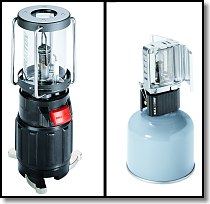 Brunton had two new lanterns, one small, the other even smaller. Both adjusted from dim to bright with no problems and they conveniently closed down the show on us that day, so it was dim enough to be able to see the difference. The "GLORB Lantern" ($60) is a refillable butane lantern that can use any quality butane lighter fluid, running 2 hours on a fill. While designed to function best with a mantle (bane of my lantern existence) producing a claimed 60 watts of light, it will work without. It has push-button piezo-electric ignition. Dimensions are 5.5 inches tall with a diameter of 2.25 inches and it weighs in at 8 ounces. The legs on the base fold out for better stability, in for storage, though you'll have to add your own bale if you want to hang it.
Brunton had two new lanterns, one small, the other even smaller. Both adjusted from dim to bright with no problems and they conveniently closed down the show on us that day, so it was dim enough to be able to see the difference. The "GLORB Lantern" ($60) is a refillable butane lantern that can use any quality butane lighter fluid, running 2 hours on a fill. While designed to function best with a mantle (bane of my lantern existence) producing a claimed 60 watts of light, it will work without. It has push-button piezo-electric ignition. Dimensions are 5.5 inches tall with a diameter of 2.25 inches and it weighs in at 8 ounces. The legs on the base fold out for better stability, in for storage, though you'll have to add your own bale if you want to hang it.
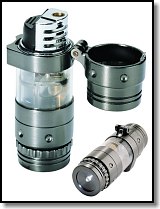 The "Lampray Lantern" ($80) is a compact folding butane cannister lantern with no glass globe. That's right, no glass to break! By compact, we mean 3.75 x 2.25 x 1.5 inches folded. It weighs 8 ounces. On the down side, it does use a mantle. It has a claimed run time of 5 hours per cartridge, producing 120 watts of light which are directed by the fold out reflectors, which protect the innards when folded and packed.
The "Lampray Lantern" ($80) is a compact folding butane cannister lantern with no glass globe. That's right, no glass to break! By compact, we mean 3.75 x 2.25 x 1.5 inches folded. It weighs 8 ounces. On the down side, it does use a mantle. It has a claimed run time of 5 hours per cartridge, producing 120 watts of light which are directed by the fold out reflectors, which protect the innards when folded and packed.
Brunton also introduced a new lighter, the "Firelight" ($40) that incorporates a single LED light in the base. It's got the usual windproof butane lighter accouterments, but it isn't waterproof in the least. Dimensions are 2.75 x 1.25 inches and it weighs 3 ounces. We like that the lid folds all the way back out of the way and it has a lanyard attachment. The white LED light operates via a rotary switch at the base.
 The Gear Keeper folks at Hammerhead Industries introduced a rotating belt clip to their line of retractors/leashes.� This makes using the Gear Keeper just that much easier and more ergonomic as you aren't working against the mechanism, it rotates to follow the line of force.
The Gear Keeper folks at Hammerhead Industries introduced a rotating belt clip to their line of retractors/leashes.� This makes using the Gear Keeper just that much easier and more ergonomic as you aren't working against the mechanism, it rotates to follow the line of force.
The new Cell Phone Security Tether with the rotating clip is perfect for those of us who seem to regularly inadvertently drop our phone.� I used it at the Miami Boat Show right after leaving SHOT Show and for once never gave my cell phone a second thought.
 Hardigg Industries, long established as a high end
protective case maker serving the commercial transport and military markets,
has entered the consumer end of the market with their "Storm Case" line.� They are aiming directly at Pelican Products and
Underwater Kinetics and appear to have done their homework.
Hardigg Industries, long established as a high end
protective case maker serving the commercial transport and military markets,
has entered the consumer end of the market with their "Storm Case" line.� They are aiming directly at Pelican Products and
Underwater Kinetics and appear to have done their homework.
Hardigg produces the cases using HPX Resin and claim that their case is as strong or stronger than the competition. Moreover, they claim superior impact resistance, especially in frigid temperatures. We compared weights and the scales tip ever so slightly in their favor for a medium sized case and with large cases the diffference is bigger.
 The latches incorporate a push button release that makes
opening a breeze, no more busted knuckles or broken fingernails. They also
claim these latches won't pop open if the case is dropped, and unfortunately I
know that some others can.� The case
comes with an automatic purge valve, a manual one is available and
retrofitable. The carrying handles are rubber cushioned, which is both more comnfortable and felt more secure. For those who
use plucked foam for protecting fragile equipment, their foam is multilayered, offering easier adaptability to fit all manner of gear. A shoulder strap is an option, we were not immpressed with ergonomics of the one we saw, but were told that they are upgrading in mid-2003 to a more ergonomic version. Wheeled cases are also available, with their own refinements and claimed advantages.
The latches incorporate a push button release that makes
opening a breeze, no more busted knuckles or broken fingernails. They also
claim these latches won't pop open if the case is dropped, and unfortunately I
know that some others can.� The case
comes with an automatic purge valve, a manual one is available and
retrofitable. The carrying handles are rubber cushioned, which is both more comnfortable and felt more secure. For those who
use plucked foam for protecting fragile equipment, their foam is multilayered, offering easier adaptability to fit all manner of gear. A shoulder strap is an option, we were not immpressed with ergonomics of the one we saw, but were told that they are upgrading in mid-2003 to a more ergonomic version. Wheeled cases are also available, with their own refinements and claimed advantages.
The current line covers the most common competitive sizes and more are in the works. We have received samples and will eventually report our findings.
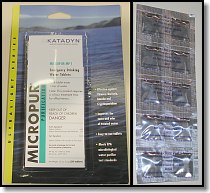 Katadyn, which bought the PUR outdoor and marine line from
Proctor and Gamble in 2001, saw its rights to the PUR name expire at the end of
2002. All the products are now being offered under the Katadyn brand name. The filter products are now
manufactured in Switzerland.
Katadyn, which bought the PUR outdoor and marine line from
Proctor and Gamble in 2001, saw its rights to the PUR name expire at the end of
2002. All the products are now being offered under the Katadyn brand name. The filter products are now
manufactured in Switzerland.
Katadyn has introduced a new tablet water purification product, the "Micropur� MP1" ($14), which uses chlorine dioxide to eliminate all the nasties. And, yes, unlike iodine (Potable Aqua or Polar Pure) or other chlorine products (Chlor-Floc, Aquatabs, Puritabs, etc.), it will reliably kill Cryptosporidium cysts (actually, chlorine dioxide doesn't contain chlorine, but that's for a more in-depth article).� They claim this is the only chemical water disinfection product registered with the EPA as a "purifier."� Chlorine dioxide leaves virtually no taste when used according to instructions and does not discolor the water.
NOTE: The other chlorine dioxide product on the market, the two-part liquid "Aquamira" ("Pristine" in Canada) by McNett, is not EPA registered. Knowledgable sources tell us its concentration level when used according to directions is not enough to do the job under all conditions. In response to our queries, McNett note that they "do not yet make specific purification claims for Aquamira in the USA," which would come as a surprise if you read their materials, but that's also a subject for another day. In any case, they have declined to answer pointed questions about their product and their claims, to provide requested results of any testing or to provide requested specifics on their claims to be "approved as a drinking water purifier in other countries."
The tablets are packaged in strips of 10 tablets (2 x 5), three strips per package, enough to treat 30 quarts/liters.� Each strip is about 6 x 2.625 x 0.125 inches. The EPA has mandated that the packaging be child proof, you will need a knife or scissors to open it. It has a three-year storage life, shorter than other treatment options.
The EPA has also required that the instructions allow four hours for treatment.� We inquired about this, since it seems awfully long for such a treatment in most cases, based on our research into chlorine dioxide water treatment. Alan Lizee, Katadyn North America president, responded that their test results verified full virus and bacteria removal (in room temperature and in cold water) in 15 minutes and elimination of cryptosporidium and giardia in 30 minutes at room temperature.� He explained that, it does take four hours for full crypto kill in cold, very dirty water.
Thus, it appears to us that the EPA required the simplistic four-hour treatment regime instructions since they figure we are incapable of determining whether water is cold or dirty.� Excuse me while I rant a bit.� It is always nice to know your government considers you an incompetent dolt incapable of understanding some simple instructions and seeks to protect you from yourself, even when it penalizes the vast majority.� It would be simple enough to provide some variable specificity of treatment depending upon water temperature or turbidity.� Polar Pure manages to do exactly that for water temperature with a little thermometer to measure water temps.
Why do I give a hoot?� Because some people are going to read those instructions, decide four hours is too long, and then either use something less effective or go without, or they'll drink it sooner and then worry, possibly with unnecessary adverse psychological effects. That's human nature. Ignoring human nature when developing methodology is rarely a good idea. Give us the facts and let the majority of us capable of doing so use products intelligently.
Based on our research into the matter and review of the Katadyn test data, our opinion is that we'd be comfortable with 30 minutes in all but the coldest and dirtiest water. Of course, water with high visible contamination concentrations should be filtered first in any case, even if just to remove the largest contaminants.�
We also inquired about the safety of using the tablet at higher concentrations, in other words, in less than a liter/quart of water, as might be the situation with an improvised water container in a survival situation.� We were told that this could be acceptable for short term use. A higher concentration (less water) may result in unpleasant taste or odor.� If someone has an adverse reaction to chlorine dioxide in general (which is a rare condition), this risk would increase (similar to the case with those having adverse iodine reactions).� However, in an emergency situation, no negative health issues would be expected.
 Key Gear Corp.A few years back Larry Legg designed the original
Swiss-Tech� Micro-Tech key chain tool.� Now he's back on his own and once
again designing interesting tools, the "Tool Pen" ($26) and the "Tool Pen Plus"
($35).� As the name implies, this is something of a multifunctional pen.�
Essentially, what you have is a double-ended screwdriver with a pen
inside. There's a flat head screwdriver tip on one end and a Phillips tip on
the other. The screwdriver tips reportedly exceed the ANSI specification of 60
inch-pounds of torque, more than any of us are likely to generate with the
relatively small handle provided by the hex-shaped cap. Inside the "industrial
grade" Nylon handle is a Fisher Space Pen cartridge, so it will write upside
down and under water and, well, you know the drill.
Key Gear Corp.A few years back Larry Legg designed the original
Swiss-Tech� Micro-Tech key chain tool.� Now he's back on his own and once
again designing interesting tools, the "Tool Pen" ($26) and the "Tool Pen Plus"
($35).� As the name implies, this is something of a multifunctional pen.�
Essentially, what you have is a double-ended screwdriver with a pen
inside. There's a flat head screwdriver tip on one end and a Phillips tip on
the other. The screwdriver tips reportedly exceed the ANSI specification of 60
inch-pounds of torque, more than any of us are likely to generate with the
relatively small handle provided by the hex-shaped cap. Inside the "industrial
grade" Nylon handle is a Fisher Space Pen cartridge, so it will write upside
down and under water and, well, you know the drill.
To use as a pen, pull the cap up slightly and the pen extends through the center of the Phillips tip.� Press the cap down and the pen retracts. To use the flat tip, move the cap to the other end. The flat tip is removed to replace the Space Pen cartridge. The strong pocket clip should keep the Tool Pen secure in your pocket.
 The Plus version incorporates a small folding knife
blade/drill inside the pocket clip. We're not sure how practical that will be,
it's not much of a blade, and since it is unlikely anyone reading this Web site would be
without at least a couple blades on them, unless illegal wherever they are, in
which case this likely would be as well, it's really superfluous.
The Plus version incorporates a small folding knife
blade/drill inside the pocket clip. We're not sure how practical that will be,
it's not much of a blade, and since it is unlikely anyone reading this Web site would be
without at least a couple blades on them, unless illegal wherever they are, in
which case this likely would be as well, it's really superfluous.
In any case, if you're going to carry a pen, might as well carry a multifunctional one. Even if you;re already carrying a multi-purpose tool, there are times when their short screwdrivers just don't quite have the reach. Next up, we'd suggest some capability to exhange alternate driver sizes.
We have been looking forward to the first practical LED based emergency "strobes" for some time now. While there have been some LED strobes developed or available, they were either impractical for consumer use, not readily portable for field use, did not have the performance to meet established performance regulatory standards, or were grossly expensive. Because an LED has a narrow angle beam, compared to a strobe dischrage tube, it takes multiple LEDs aimed around the hemishpere to get the coverage needed to perform the same as a typical emergency strobe.
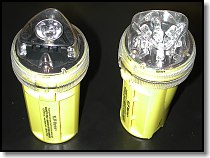 Kliptek is a Canadian company that has set out to supply a solution and is bringing a product to market. They were making the rounds of the shows demonstrating the product to drum up advance interest and gauge opinions about various options and directions they might take. More than just a simple strobe, it is a modular system that will allow a single body containing the power source to fit multiple interchangeable heads configured for various purposes, including, for example, boat navigation lights or buoy marker lights. The units has different LED configurations inside, depending upon there intended use. A unit primarily designed as a strobe has the most LEDS and they are arrayed to provide full coverage.
Kliptek is a Canadian company that has set out to supply a solution and is bringing a product to market. They were making the rounds of the shows demonstrating the product to drum up advance interest and gauge opinions about various options and directions they might take. More than just a simple strobe, it is a modular system that will allow a single body containing the power source to fit multiple interchangeable heads configured for various purposes, including, for example, boat navigation lights or buoy marker lights. The units has different LED configurations inside, depending upon there intended use. A unit primarily designed as a strobe has the most LEDS and they are arrayed to provide full coverage.
 The product is comprised on a plastic base unit, something of a triangular cylinder, which holds the battery carrier containing three AA-cell batteries. The top of the battery carrier serves as part of the switching mechanism and has a plug that carries the power to the head. The head contains the circuit board and chips to power and control the lights. The head screws onto the base and acts as a rotary multi-function switch. There is also a water sensor that activates when the unit is submerged in water. Reportedly, just splashing it won't activate it. The unit floats upright.
The product is comprised on a plastic base unit, something of a triangular cylinder, which holds the battery carrier containing three AA-cell batteries. The top of the battery carrier serves as part of the switching mechanism and has a plug that carries the power to the head. The head contains the circuit board and chips to power and control the lights. The head screws onto the base and acts as a rotary multi-function switch. There is also a water sensor that activates when the unit is submerged in water. Reportedly, just splashing it won't activate it. The unit floats upright.
There were a variety of heads shown with many different combinations of LEDs arranged for various purposes. By way of example, a typical unit aimed at the broad marine market, the "Klip Marine Multi Function White" would provide:
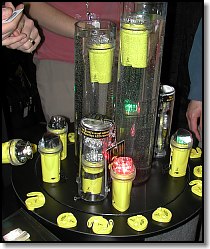 Water activated strobe - all LEDs (1 pulse per second)
Water activated strobe - all LEDs (1 pulse per second)
A single unit with any head is expected to be priced at $150. Added heads are expected to be $100 each. Individual heads will come with a screwed-on watertight carrier to keep their circuitry dry and which that can be secured with a lanyard. Kliptek hope to have these for sale early this summer.
 If you're a traditionalist who has favored Marble's brass cased compasses, you are either going to be ecstatic or horrified by their
change to a liquid filled compass.� Your dry version is now a collector's item, so to speak.� Hopefully, Marble's will maintain the quality, even with using a liquid filled capsule.� Both pin-on and pocket compass are $15.
If you're a traditionalist who has favored Marble's brass cased compasses, you are either going to be ecstatic or horrified by their
change to a liquid filled compass.� Your dry version is now a collector's item, so to speak.� Hopefully, Marble's will maintain the quality, even with using a liquid filled capsule.� Both pin-on and pocket compass are $15.
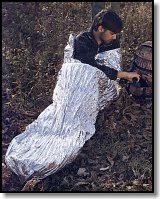 MPI, the originator of the metalisized Mylar "Emergency Space Blanket" have
introduced� the "next generation of
personal outdoor protection." Despite all the hype over the years, research has shown that the
typical metalized emergency blanket/bag doesn't offer much better thermal performance
than a plastic sheet or bag. It mostly acts a a wind and vapor barrier.� The only
way to really take advantage of the reflectivity is to put some insulation
between you and the reflective surface. Enter the "Extreme Pro-Tech Bag" ($30)
and "Extreme Pro-Tech Vest" ($35).
MPI, the originator of the metalisized Mylar "Emergency Space Blanket" have
introduced� the "next generation of
personal outdoor protection." Despite all the hype over the years, research has shown that the
typical metalized emergency blanket/bag doesn't offer much better thermal performance
than a plastic sheet or bag. It mostly acts a a wind and vapor barrier.� The only
way to really take advantage of the reflectivity is to put some insulation
between you and the reflective surface. Enter the "Extreme Pro-Tech Bag" ($30)
and "Extreme Pro-Tech Vest" ($35).
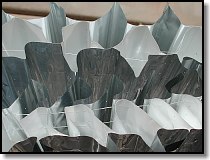 The improved performance is based on adding insulation to
the product with three layers of material that form air pockets.� The three layers are each pleated and are
bonded together to produce channels.�
The outer layer is solid, the inner two layers are perforated to allow
moisture to evaporate away from you body and clothing. Elastic strings run
through the material to ensure it both hugs you and to maintain the accordion
pleats that form the air spaces. It's a
lot easier to see than to describe, so check out the photos.
The improved performance is based on adding insulation to
the product with three layers of material that form air pockets.� The three layers are each pleated and are
bonded together to produce channels.�
The outer layer is solid, the inner two layers are perforated to allow
moisture to evaporate away from you body and clothing. Elastic strings run
through the material to ensure it both hugs you and to maintain the accordion
pleats that form the air spaces. It's a
lot easier to see than to describe, so check out the photos.
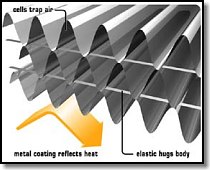 The bonding is also claimed to solve one of the vexing
problems with the Mylar blankets and bags; once holed, they rip very easily and
without stopping, it's not a ripstop material.
The bonding is also claimed to solve one of the vexing
problems with the Mylar blankets and bags; once holed, they rip very easily and
without stopping, it's not a ripstop material.
Intuitively, it seems this ought to work. Obviously, if you are laying down, the compressed material isn't gong to do much but keep you drier, but that true for most lightweight insulating products, reason sleeping mats are so popular and why we gather insulation to lay down on in a survival situation.
The bag is 36 x 84 without the elastic. Both are vacuum packaged for minimum bulk, though obviously they aren't quite as small as the single layer products. The vest weighs in at 9.25 oz., the bag at 11 oz.� We're looking forward to testing this stuff.
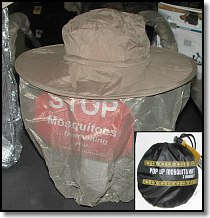 MPI also introduced the "Pyramid Pop-up Hat and Head Net" ($13) mosquito head net. The nylon full brim hat has a wire rim that when twisted collapses into a flat bundle (think car sun-shades for those who live in sunny climates) which is stored in the provided drawtight bag. Unlike some others on the market, the round wire doesn't cut into the netting, a definite plus. Available in both green and khaki and in medium and large sizes.
MPI also introduced the "Pyramid Pop-up Hat and Head Net" ($13) mosquito head net. The nylon full brim hat has a wire rim that when twisted collapses into a flat bundle (think car sun-shades for those who live in sunny climates) which is stored in the provided drawtight bag. Unlike some others on the market, the round wire doesn't cut into the netting, a definite plus. Available in both green and khaki and in medium and large sizes.
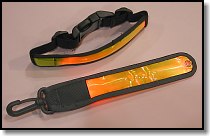 Nite Ize, best known for all their mini-mag style flashlight accessories, had some cool new night safety/location/signaling products, a "Clip-On Marker" ($13) and "Marker Band" ($15) utilizing Polybrites International's patented polymer/LED technology. While we've seen this technology used in commercial gear like safety vests and such, it's nice to see it trickling down to affordable consumer oriented gear.
Nite Ize, best known for all their mini-mag style flashlight accessories, had some cool new night safety/location/signaling products, a "Clip-On Marker" ($13) and "Marker Band" ($15) utilizing Polybrites International's patented polymer/LED technology. While we've seen this technology used in commercial gear like safety vests and such, it's nice to see it trickling down to affordable consumer oriented gear.
The units are powered by an easily replaced 3-volt lithium coin cell. The LED illuminates the polymer strip contained inside the clear plastic covered sheath, which is backed by conventional retro-reflective material for added visibility protection if a light is shined on it. When illuminated with the internal LED it is claimed to be visible from one mile. The dual-mode switch allows either constant on or flashing operation and they claim 200 hours battery life.
We didn't get a measurement and out email still isn't answered, but we estimate the illuminated portion of the Markers are about 7 inches for the Band, about an inch less for the Clip-On. The marker is equipped with a plastic rotating clip and has a grommet in the end. The Band is affixed to one inch nylon webbing with a quick release buckle and which si adjustable from 9 to 16 inches in diameter.
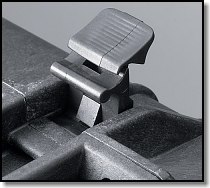 Spurred on by the innovations introduced by Hardigg in their
Storm Case line, Pelican has made a few improvements to their own well-regarded Protector
Cases.� The latches on all but the
smallest cases are now two-part, double throw designs that makes it easier to
unlatch.� They have also replaced their
manual purge valve with an automatic valve.��
Spurred on by the innovations introduced by Hardigg in their
Storm Case line, Pelican has made a few improvements to their own well-regarded Protector
Cases.� The latches on all but the
smallest cases are now two-part, double throw designs that makes it easier to
unlatch.� They have also replaced their
manual purge valve with an automatic valve.��
 SIGG is bringing back an old product line that will be a
prefect storage solution for many--aluminum storage boxes. Initially, these
will come in two sizes, "Alu Box Midi" ($25) and "Alu Box Maxi" ($29), 170 x
117 x 60 mm and 228 x 145 x 77 mm, respectively.� These sturdy anodized boxes have a gasketed lid with and roller
snap locks on each end. These are much lighter that some stainless ones that
we've see in the recent past.� Avialble
in natural aluminum, red metallic, reflexblue metallic and beige metallic. The
red and blue are really sharp looking.�
If you caught on that there's a "mini" missing, we asked too.� Answer was "maybe."
SIGG is bringing back an old product line that will be a
prefect storage solution for many--aluminum storage boxes. Initially, these
will come in two sizes, "Alu Box Midi" ($25) and "Alu Box Maxi" ($29), 170 x
117 x 60 mm and 228 x 145 x 77 mm, respectively.� These sturdy anodized boxes have a gasketed lid with and roller
snap locks on each end. These are much lighter that some stainless ones that
we've see in the recent past.� Avialble
in natural aluminum, red metallic, reflexblue metallic and beige metallic. The
red and blue are really sharp looking.�
If you caught on that there's a "mini" missing, we asked too.� Answer was "maybe."
|
| SELECT AND USE OUTDOORS AND SURVIVAL EQUIPMENT, SUPPLIES AND TECHNIQUES AT YOUR OWN RISK. Please review the full WARNING & DISCLAIMER about information on this site. |
Publisher and Editor: Doug Ritter
Email: Doug Ritter
URL:
http://www.equipped.org/shot_show_2003_gear.htm
First Published: March 10, 2003
Revision: March 12, 2003
![]()
Email to: [email protected]
|